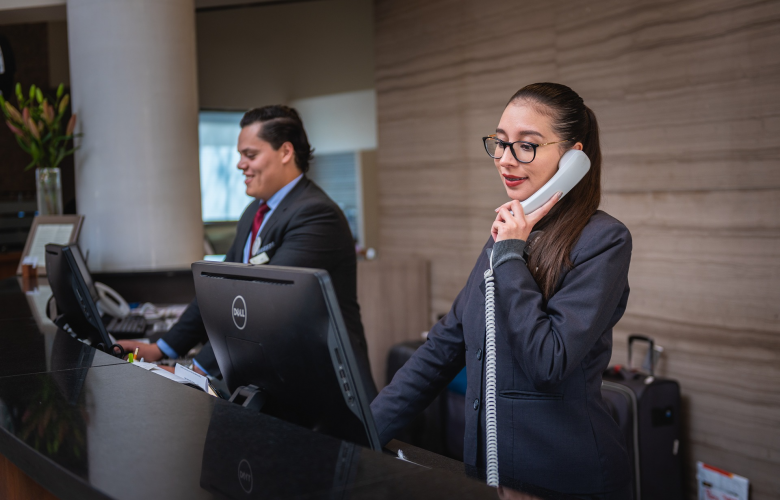Building Resilient Hotels: The Power of Automation in Navigating Workforce Challenges
Contact
Building Resilient Hotels: The Power of Automation in Navigating Workforce Challenges
By Murphy Mathew, APAC solutions engineer, IDeaS.
As travel activity rebounds—and even exceeds pre-pandemic levels in some markets—across Australia and the Asia Pacific region, hoteliers face a critical challenge: hiring and retaining experienced, specialist staff.
The labour shortage, exacerbated by an exodus of seasoned staff through the pandemic, has left many properties struggling to maintain standards and meet guest expectations.
For hotels facing labour shortages, automating many of the routine daily tasks on their team’s to-do lists can help to meet guest needs and drive revenue.
However, embracing automation should not be viewed as a temporary fix, it is a strategic move towards building a more resilient and efficient hotel business.
How automation can help hotel operations
Through integrating automated technologies into daily operations, hotels can streamline processes, reduce manual workload, and ensure consistency in service delivery.
For instance, efficient check-in and check-out processes can be achieved with the use of automated kiosks or app-based check-in.
These systems allow guests to handle their arrivals and departures seamlessly, enhancing their overall experience.
This technology also frees up front desk staff to focus on providing more personalised services, which is crucial for maintaining high levels of guest satisfaction even when the hotel is understaffed.
In the area of housekeeping and cleaning services, automation tools can optimise schedules based on real-time occupancy data.
This ensures that rooms are cleaned efficiently, reducing wait times for guests and allowing housekeeping staff to manage their tasks more effectively. These systems not only improve operational efficiency but also helps maintain cleanliness and high levels of quality service for guests.
The use of chatbots and automated concierge services can help to automate key areas of guest services as well. These tools can handle a wide range of enquiries, from restaurant reservations to information about local attractions.
They provide instant responses, improving guest satisfaction by meeting their needs promptly.
Additionally, they allow staff members to focus on more complex guest requirements, ensuring that personalised attention is still a key part of the guest experience, even if a property is operating with lower staffing levels.

Evolving revenue management practices
Hotels traditionally relied on manual-based revenue management approaches that looked at a hotel’s booking history and current activity levels to forecast demand.
During periods of high demand, revenue managers would increase rates. When demand was low, they would discount them, thereby generating best-case revenue under both scenarios.
However, executing forecasting, inventory controls, and pricing decisions optimally will rarely be this simple, especially with a shortage of experienced personnel.
The reality is that, today, amid ongoing hotel staffing shortages across key specialist areas and a heavy reliance on online travel agents and flash sales, it’s almost impossible for management to look at a hotel’s booking history and manually identify trends because the booking patterns are fluctuating constantly, driven by rapid changes in consumer behaviours.
In a high-speed environment, manually collecting, evaluating and calculating data via spreadsheets is not only a tedious process, it is also slow and highly susceptible to mistakes and missed opportunities.
This is where an advanced revenue management system (RMS) makes a huge difference to both the top and bottom line.
Through a series of specialised algorithms and calculations, an RMS automatically assesses hotel performance and market demand and deploys pricing decisions across the distribution ecosystem accordingly.
Combined with highly visual user dashboards, an RMS enables team members across the organisation to quickly understand future and current market demand using data at both the market and hotel level—all of which are vital to both delivering and growing hotel profitability.

Allow hotel revenue teams to accomplish more, with less
In many cases today hotel revenue managers are no longer responsible for a single property, or a handful of properties within a hotel group. Many revenue leaders are now responsible for a cluster of properties and expected to make strategic revenue decisions for up to a dozen—or more—hotels every day.
This adds significant workload to revenue managers, pressuring them to ensure the rates put out by their hotels reflect real-time market trends.
To practice revenue management effectively across so many properties, it is critical hotels can access their group’s (or single property’s) systems at any time of the day and in any environment.
Adding to these challenges are also rival properties’ abilities to respond to the fluctuating market demand and change rates at will.
The modern revenue and distribution environment is incredibly complex. Distribution channels have grown rapidly, as have the number of data points to analyse in order to make the correct distribution and pricing decisions.
Collating this information into a single vision of the truth is a time-consuming and laborious process and leaves sparse time to think strategically and make effective decisions that drive revenue and profitability in the long term.
Hotel revenue managers’ time is far better spent interrogating data and responding to insights rather than sourcing and sorting data into countless spreadsheets and reports.
An AI-powered RMS that works hand-in-glove with revenue leaders to implement tactical decisions and automatically distribute rates and inventory controls to the entire distribution environment serves as a force multiplier for thinly stretched teams.
This allows them to focus on critical short-term hotel pricing issues that may arise and better execute a hotel’s long-term revenue strategy.

Build a resilient and efficient business with automation
The adoption of automated technologies within hotel operations is no longer an aspiration, but a necessity for the many hoteliers facing labour shortages.
Automation offers hotels a strategic advantage by streamlining daily tasks, ensuring service consistency, enabling personalised guest experiences, providing a platform for future growth and driving revenues even with limited staff.
Through embracing automation, hotels can enhance workforce utilisation and build a more resilient and efficient business model, capable of adapting to fluctuating market demands.
For more information on how your hotel can benefit from automated revenue management technologies, please visit: www.ideas.com











